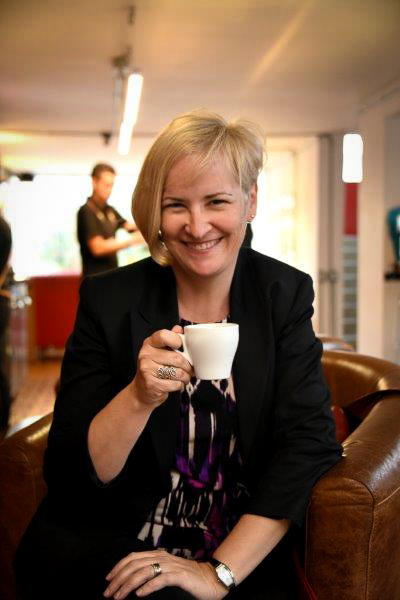Karen is an American expat who came to Latin America 22 years ago and never left. Read about her Colombian experience below, or have a look at her blog, Flavors of Bogota, and follow her on Twitter @FlavorsofBogota to keep up with her adventures.
 About Karen
About Karen
Q: Where are you originally from?
A: I’m from Philadelphia, USA.
Q: When did you move to Bogotá?
A: I’ve been living in Latin America since 1996, so I’ve been enjoying expat life for 22 years now!
Q: Did you move to Colombia alone or with a spouse/family?
A: I originally moved to Latin America alone.
Q: Why did you move? What do you do?
A: I moved to Latin America to do volunteer work, which I still do. I also have a boutique coffee tourism business, where I teach both locals and foreigners about coffee in Colombia.
Living in Bogotá
Q: What do you enjoy most about Bogotá? How would you rate the quality of life compared to Philadelphia?
A: I enjoy expat life because I feel free of the barriers I’d have at home. I can be who I want to be, live as simply as I like, work at what I love, and not worry about keeping up with the Joneses.
Q: Any negatives? What do you miss most about home?
A: Cheap peanut butter can be hard to find in Latin America.
Q: What are the biggest adjustments you had to make when settling into expat life in Bogotá? Did you experience any particular elements of culture shock?
A: Everything is different, so I basically had to adjust to everything. I’ve had to deal with a lack of cleanliness, running water, and electricity, an abundance of bugs, a lack of basic food items, and other issues. Also, the mentality of local people can be quite different from what I grew up with, which, on a positive note, has helped me to see beyond the walls that I set up in my head and make friends with all sorts of people.
Q: What’s the cost of living compared to home? What is cheap or expensive in particular?
A: Almost everything is cheaper, except clothing and imported products.
Q: How would you rate the public transport in Bogotá? What are the different options? Do you need to own a car?
A: Getting around Bogotá is difficult on public transport, but having your own car is worse! Most large cities in Latin America are quite congested, but if there’s a good metro or bus system, it can be better than driving. Bogotá drivers are notoriously reckless and rather aggressive, so I feel more comfortable on public transportation.
Q: How would you rate healthcare in Colombia? Have you had any particularly good/bad experiences with regard to doctors and hospitals? Are there any hospitals you would recommend?
A: I’ve had better healthcare experiences in Bogotá than back home. When I’ve needed care over several weeks, I’ve even had doctors get teary-eyed on the last appointment! That kind of care I never got in the States.
Q: What are the biggest safety issues facing expats living in Bogotá? Are there any areas expats should avoid?
A: Almost everyone I know here has been robbed. In any country, there are areas we should avoid visiting unless we live there. I personally haven’t been robbed in Bogotá, but I’m careful about what kind of bag I use, how I carry it, and where I go at night.
Q: How do you rate the standard of housing? What different options are available for expats?
A: In Bogotá, you can find all sorts of housing arrangements, almost all of them cheaper than in the United States.
Q: Any areas/suburbs you’d recommend for expats to live in?
A: There are so many areas to live in Bogotá, it’s hard to narrow it down. I would suggest living as close as you can to work, since you’ll spend a lot of time in traffic otherwise.
Meeting people and making friends in Bogotá
Q: How tolerant are Colombians of foreigners? Is there any obvious discrimination against particular religions or women, etc.?
A: Colombians tend to be open and warm, but there is some racial discrimination in the country.
Q: Was it easy meeting people and making friends? How did you go about meeting new people?
A: Since I belong to a local congregation, it’s like having a ready-made family of expats and foreigners to belong to. Also, through my work in coffee tourism, I meet many people and never feel lonely.
About working in Bogotá
Q: Did you have a problem getting a visa or work permit? Did you tackle the visa process yourself, or did you enlist the services of an immigration consultant?
A: Since I married a Colombian, I haven’t had a problem obtaining visas. I’ve figured out the procedure myself (with some tears and hair pulling, but eventually I got it done).
Q: What’s the economic climate like in Bogotá? Do you have any tips for expats looking to find a job? Which resources did you find most useful?
A: I would never recommend coming to Latin America to look for a job, since jobs are generally scarce and poorly paid. The best option is to find a job abroad that brings you here. Like many expats, I started my own company in Colombia, which gives me more flexibility in my schedule and better pay – and I’m doing what I love. Here, expats often teach in schools, academies and universities.
Q: How does the work culture differ from the USA? Do you have any tips for expats doing business in Colombia?
A: In Bogotá, most businesses expect their employees to work long hours and many days. That’s something to check with a future employer – what the true expectations will be.
~ Interviewed May 2018



